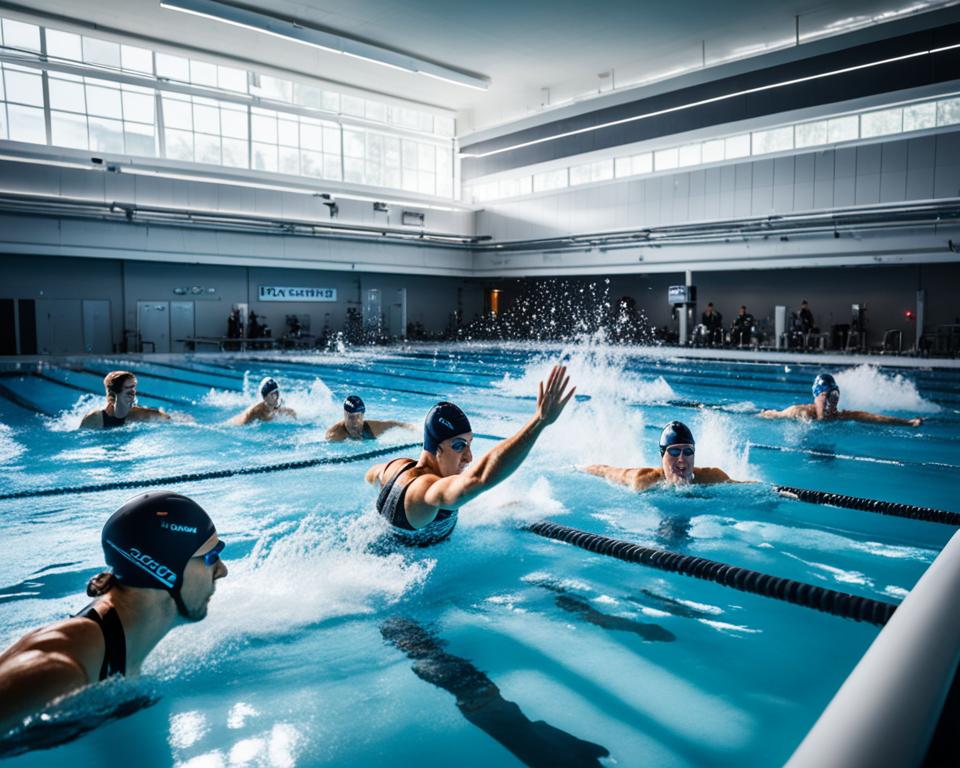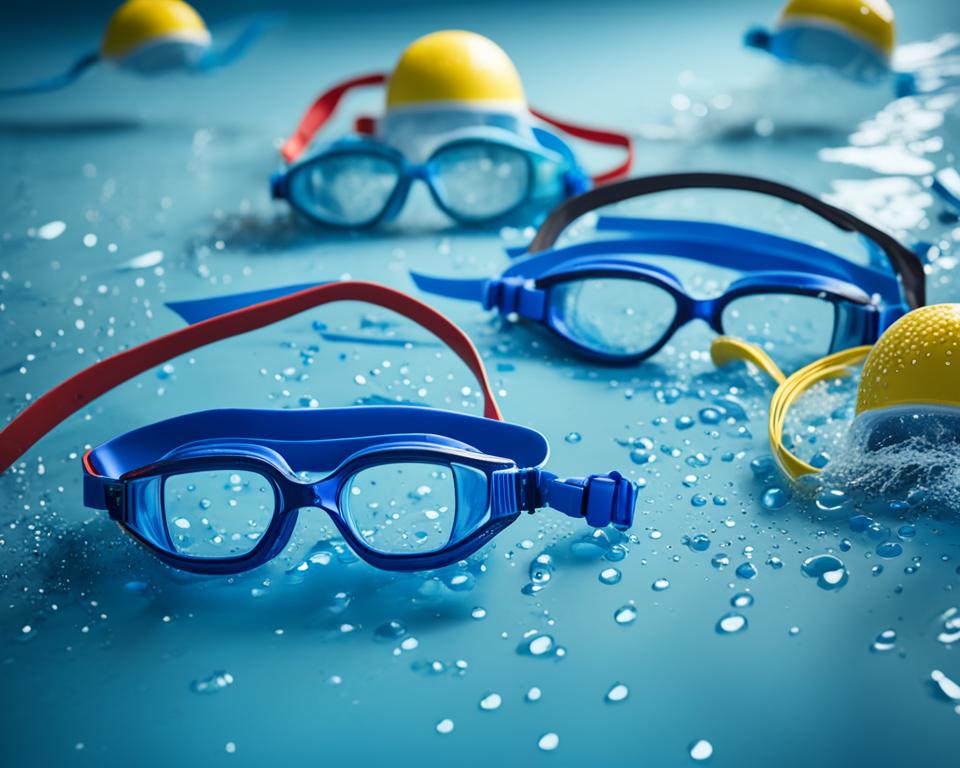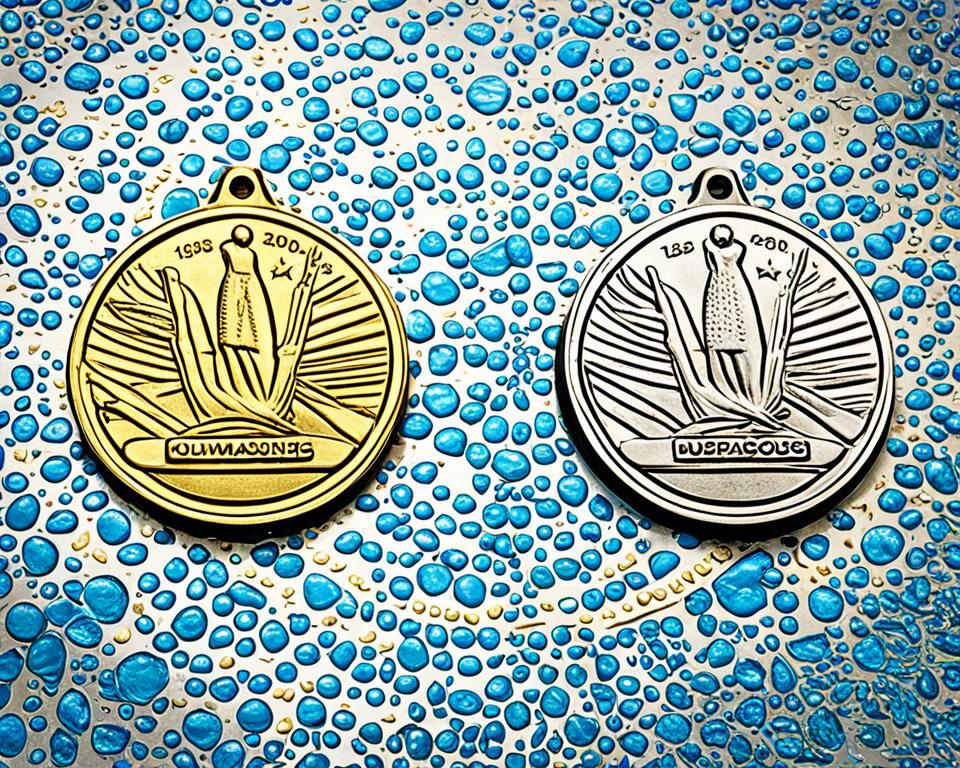The Olympic Games are where the world’s top athletes show their amazing skills. Swimming events are among the favorites, with memorable champions through the years. Let’s dive into Olympic swimming medals, looking at their history and the great swimmers who’ve made history.
Swimming has been key at the Olympics from the start until now. Athletes compete for gold, silver, and bronze, showing their unmatched skills. These medals symbolize hard work, endless training, and strong will from the best swimmers.
The champions in swimming are an important part of the Olympics. They inspire athletes everywhere and draw in fans globally. We’ll see their achievements and exciting moments that make swimming a highlight of the Olympics.
Read more interesting information at ::lansdowne-moody
Introduction to Swimming Medals at the Olympics
The Olympics recognize swimming as a key sport, with medals that highlight the best swimmers’ talents. Since 1896, these medals have been a dream for swimmers worldwide. They inspire athletes and wow fans with records being broken in every game.
Olympic swimming is always a highlight. The pursuit of olympic swimming medals shows the athletes’ dedication. This journey is filled with stories of joy, sadness, and the drive to be the best.
Swimming at the Olympics has evolved greatly. What started with a few events now has many. The growth of olympic swimming medals reflects the sport’s expansion. Winning a medal is a result of years of effort and a desire for victory.
“The pursuit of an Olympic swimming medal is the ultimate goal for any competitive swimmer. It’s a testament to the dedication, skill, and perseverance required to reach the pinnacle of the sport.”
Today’s top swimmers keep raising the bar. The dream of an Olympic medal is more alluring than ever. It captivates viewers and encourages the next generation of swimmers to chase their dreams.
| Olympic Event | Year Introduced | Number of Medals Awarded |
|---|---|---|
| 100m Freestyle | 1896 | 3 |
| 200m Freestyle | 1900 | 3 |
| 400m Freestyle | 1896 | 3 |
| 1500m Freestyle | 1908 | 3 |
| 100m Backstroke | 1896 | 3 |
| 200m Backstroke | 1904 | 3 |
| 100m Breaststroke | 1908 | 3 |
| 200m Breaststroke | 1924 | 3 |
| 100m Butterfly | 1956 | 3 |
| 200m Butterfly | 1956 | 3 |
| 200m Individual Medley | 1964 | 3 |
| 400m Individual Medley | 1964 | 3 |
The Origins of Olympic Swimming Competitions
Competitive swimming dates back to ancient Greek times. It was seen as a vital skill, included in their athletic festivals. These laid the base for today’s Olympic swimming.
Ancient Greek Precursors to Modern Swimming Events
In ancient Greece, swimming was more than fun; it was a life-saving skill. It was part of several big games, like the Olympics. Though these games were simpler, they highlighted the Greeks’ swimming and athletic abilities.
The “Dolichos” was a major event, a long swim in the Aegean Sea. Swimmers would race between islands, showing off their strength and skills. Swimmers also did the “Halisternos,” diving to recover sunk treasures.
The Greeks linked swimming with military training. Soldiers had to be strong swimmers to be combat-ready. This approach helped form the varied swimming events seen in the Olympics today.
“Swimming was not merely a recreational activity in ancient Greece, but a crucial skill that was deeply woven into the fabric of their cultural and military traditions.”
The ancient Greeks’ swimming heritage profoundly shaped swimming as we know it. It led to the creation of events in the modern Olympics. Thus, the origins of olympic swimming reflect our ageless pursuit of greatness through sports.
Swimming Medals: A Journey Through the Years
The story of Olympic swimming medals is a rich tale that’s full of milestones and unforgettable moments. These gatherings show the sport’s journey over time. They highlight astounding performances, inspiring tales, and the heart of Olympic swimming.
Major Milestones and Memorable Moments
The Olympic swimming journey has seen groundbreaking moments that changed the game. For instance, the 1988 Seoul Olympics introduced the 50-meter freestyle. This event quickly became a favorite, showing the world’s top swimmers and their incredible speed.
Legends like Michael Phelps and Katie Ledecky have stunned the world by breaking records. Their feats, dedication, and good sportsmanship inspire many to aim high in the pool.
“The feeling of being in the moment, of giving it your all, is unparalleled. That’s what drives me to keep swimming and chasing my dreams.”- Katie Ledecky, five-time Olympic gold medalist
The Olympic swimming medals story also includes tales of friendship and resilience. Swimmers from all over the world often cheer and hug, showing the Olympics’ true spirit. These scenes of unity are as memorable as the wins themselves.
The Olympic swimming events are always growing, introducing new events and technologies. Yet, the magic of the sport never fades. The quest for greatness, the excitement of the games, and the celebration of victories continue to shape the legacy of Olympic swimming.
Olympic Swimming Events and Disciplines
The Olympic Games highlight a wide range of olympic swimming events and olympic swimming disciplines. Each test swimmers in different ways, showing off their varied skills in the water.
There are classic freestyle races where swimmers show speed and power. Plus, there’s backstroke, breaststroke, and butterfly, which need technique. The medleys test swimmers’ skills in all these strokes.
In relays, four swimmers team up. They need to use strategy and work together well. Relay events include freestyle, medley, and mixed-gender. They highlight both personal and team achievements.
Aside from these, there’s open-water marathon swimming. Athletes swim long distances in natural waters. This tests their stamina and mental strength.
The collection of olympic swimming events and olympic swimming disciplines has grown. New events and styles have been added over the years. This reflects the changing and expanding skills of top swimmers.
“Swimming is the closest thing we have to an Olympic decathlon. It’s unreal what these athletes can do in the water.”
From fast sprints to long, tough swim races, the Olympics in swimming is a spectacle. It shows how far human athletes can push themselves in water sports.
Swimming Medals: Coveted Prizes in Aquatic Feats
The Olympic swimming medals are the top prizes in the water sports world. They stand for reaching the highest level of sports. The athletes who win these glittering medals have shown the world their talent and hard work.
Gold, Silver, and Bronze: The Hierarchy of Accomplishment
Gold medals are the best you can get. They show that the winner is the fastest and strongest in their event. These swimmers break records and become legends in the sport.
Silver medals are for the second-best. They are for those right behind the gold winner. Their skill and effort are still amazing.
Bronze medals are for the third-place finishers. Winning bronze shows they are among the world’s best. It proves how tough Olympic competition really is.
| Medal | Significance | Achievements |
|---|---|---|
| Gold | Ultimate triumph | Fastest, most dominant swimmers |
| Silver | Exceptional performance | Narrowly missed the top spot |
| Bronze | Recognized excellence | Demonstrated resilience and competitive spirit |
Every Olympic medal is a sign of great achievement and dedication. These medals show the world the incredible talent of swimmers. They inspire people for generations.
Iconic Olympic Swimming Champions
The history of Olympic swimming shines with legends. These iconic Olympic swimming champions have wowed us with their amazing feats, setting new standards.
Mark Spitz: The Unparalleled Seven-Time Gold Medalist
Mark Spitz, from the U.S., is a celebrated legendary Olympic swimmer. He made history in 1972 with seven golds in one Olympics. Spitz’s iconic mustache and unmatched success made him a legend.
Michael Phelps: The Winningest Olympian of All Time
Michael Phelps stands as the top iconic Olympic swimming champion. Across five Olympics, he captured 28 medals, 23 of them gold. His hard work and talent earned him the title “greatest swimmer of all time.”
Katie Ledecky: Redefining Dominance in Women’s Swimming
Katie Ledecky, the American freestyle powerhouse, is among the legendary Olympic swimmers. Her multiple world records and gold medals make her one of the best. Ledecky’s dominance is unmatched in her sport’s history.
| Swimmer | Olympic Medals | Notable Achievements |
|---|---|---|
| Mark Spitz | 7 Gold | Held the record for most gold medals won in a single Olympic Games until 2008 |
| Michael Phelps | 28 (23 Gold, 3 Silver, 2 Bronze) | The most decorated Olympian of all time, winning a record-breaking 23 gold medals |
| Katie Ledecky | 7 Gold, 3 Silver | Holds numerous world records and has dominated women’s freestyle events in the 21st century |
These iconic Olympic swimming champions inspired countless athletes with their talent and sportsmanship. They’ve made an unforgettable impact on the sport, encouraging others to dream big.
World Records and Astonishing Swimming Performances
Olympic swimming has seen amazing world records and stunning feats of athleticism. It showcases swimmers who have redefined what’s possible in the water. They set new standards and wow viewers everywhere.
Many outstanding world records have been set in Olympic swimming. Swimmers have shown their incredible skill and physical strength in contests ranging from short sprints to long races.
One such amazing feat is Caeleb Dressel’s record in the men’s 100m freestyle. He set a time of 47.02 seconds at the 2020 Tokyo Olympics. This obliterated the old record, showing his absolute dominance.
| Event | World Record Holder | Record Time | Year Set |
|---|---|---|---|
| Men’s 100m Freestyle | Caeleb Dressel (USA) | 47.02 seconds | 2020 |
| Women’s 200m Butterfly | Liu Xiang (China) | 2:01.53 minutes | 2012 |
| Men’s 1500m Freestyle | Sun Yang (China) | 14:31.02 minutes | 2012 |
| Women’s 400m Individual Medley | Katinka Hosszú (Hungary) | 4:26.36 minutes | 2016 |
These records show the amazing speed, skill, and endurance of the world’s top swimmers. Their feats inspire everyone and set new standards for the sport.
The Olympics have also seen some incredible individual performances. Michael Phelps with his eight gold medals in a single Games. And Katie Ledecky’s unmatched skill in long-distance freestyle events. These athletes have truly made the pool their place to shine.
“Swimming is normal for me. I’m relaxed. I’m comfortable, and I know my surroundings. That’s my home.” – Michael Phelps
The world records and top-notch performances in swimming have captured hearts worldwide. This has made swimming one of the most exciting and respected events in global sports.
The Medal Tally: Nations Dominating Olympic Swimming
Over many years, certain countries have shown their strength in Olympic swimming. They have won many medals, proving their power in the sport.
Statistical Analysis of Swimming Powerhouses
The United States is often seen as the world leader in swimming. Its swimmers win a big part of the medals every year.
Australia, China, and Great Britain have also been very successful in swimming. Their achievements come thanks to excellent training, great coaches, and many skilled swimmers.
| Country | Total Swimming Medals | Gold Medals | Silver Medals | Bronze Medals |
|---|---|---|---|---|
| United States | 2,794 | 1,059 | 841 | 894 |
| Australia | 851 | 237 | 246 | 368 |
| China | 713 | 219 | 205 | 289 |
| Great Britain | 551 | 140 | 165 | 246 |
The table above underscores how countries like the United States excel in medal tally swimming at the Olympics. The U.S. has an incredible 2,794 swimming medals, showing their long-standing success in the sport.
These countries’ achievements in nations dominating olympic swimming show their deep commitment to excellence. They invest in top training and support future swimming stars.
Behind the Scenes: Training and Preparation for Olympic Glory
Athletes aiming for Olympic swimming success commit to intense training and perfect preparation. This journey shows their deep commitment and drive for perfection.
Olympic swimming training is complex. It involves working on physical, mental, and technical skills. Swimmers perfect their moves and strive to improve their water skills every day.
Before the Olympics, swimmers start their preparation years in advance. They and their coaches create detailed plans. These plans help them become stronger, faster, and smarter swimmers over time.
| Training Aspects | Importance |
|---|---|
| Stroke Technique | Perfecting the mechanics of each stroke to maximize efficiency and speed |
| Endurance Training | Building the cardiovascular and muscular endurance required for long-distance events |
| Strength and Conditioning | Developing the power and explosiveness needed for short-distance sprints |
| Mental Preparation | Cultivating the focus, resilience, and competitive mindset to excel under pressure |
Olympic swimmers also work on specific preparation for olympic swimming. They adjust their race strategies, imagine their performance, and practice dealing with unexpected changes. This complete training and preparation method builds future Olympic champions, ready to shine in the pool.

“The will to win is nothing without the will to prepare.” – Juma Ikangaa, Tanzanian long-distance runner
The Future of Olympic Swimming: Emerging Talents and Innovations
Swimming, an ever-changing sport, is getting ready for a big future shift. Today’s young swimmers are preparing to show their skills to the world. At the same time, new techniques are changing how athletes prepare and compete. Get ready to meet the stars of tomorrow and see how swimming is changing.
Predictions and Trends in the Sport’s Evolution
Youth swimmers from all corners of the world are already stunning us with their abilities. Emerging swimming talents, like Regan Smith from the U.S. and Rikako Ikee from Japan, are going to challenge the top names. They’re set to make new records in the sport.
But it’s not just about the amazing athletes. How we swim is also evolving with new technologies. There are swimsuits designed to help swimmers be faster. Plus, there’s advanced analysis and coaching via video. These changes are taking swimming to a whole new level, letting athletes break their own limits.
Swimming is on a path of great change. We’re going to see incredible things in the sport. With young swimmers full of talent and the latest tech, the Olympics are going to be really exciting. The sport is going to captivate everyone and inspire more to follow their water dreams.
“The future of Olympic swimming is bright, with a wave of talented young athletes and pioneering technologies that will redefine the sport’s limits. Get ready for a thrilling new era of aquatic excellence.”
The Olympic Spirit: Sportsmanship and Camaraderie in Swimming
The Olympic Games go beyond just sports. They are about the deep bond and respect among athletes worldwide. Nowhere is this seen more than in swimming. Here, swimmers chase personal dreams but always support each other.
The Olympic spirit is about playing fair and not just winning. In swimming, this means swimmers often put their team and fellow swimmers first. Champs and those less famous help each other on their journey to be the best they can be.
At the London 2012 Olympics, Missy Franklin from the U.S. congratulated Australia’s Alicia Coutts warmly. This was after a tough race. Franklin’s smile and handshake showed what the Olympics are truly about. They are about the friendships and respect between athletes, more than just the medals.
“The Olympics are not just about winning, but about coming together as a global community to celebrate the human spirit. It’s in these moments of shared triumph and defeat that we truly understand the power of sport to transcend borders and unite us all.”
Such moments of respect and friendship are common in the Olympics. They show the true values of this global event. When the best swimmers meet, they bring respect and admiration for their peers. They leave with friends and memories, more important than any medal.
From the start of the race to the awarding of medals, swimming in the Olympics teaches us a lot. It teaches us how sports can unite people from all over, going beyond national lines and cultures. This unity, sportsmanship, and friendship tell the real story of the Olympic Games. They inspire athletes and fans for years to come.
Controversies and Challenges in Olympic Swimming
Olympic swimming is known for its exciting events and stories that inspire. Yet, it has its own set of controversies and difficulties. Doping scandals, rule changes, and new technology are just a few issues. These problems have definitely affected the athletes and the sport as a whole.
The use of banned substances by important swimmers has brought a dark mark on the sport. This has made people wonder about the fairness of the games. Despite stricter rules and punishments, some athletes still try to cheat.
New technologies, like advanced swimsuits, have changed swimming. Some people think these suits unfairly help certain swimmers. Due to these concerns, rules about what swimmers can wear have been made. This is an effort to make the competition fair for everyone.
| Controversy | Impact |
|---|---|
| Doping Scandals | Tarnished reputation, stricter testing, harsher penalties |
| Technological Advancements | Debates over fairness, rule changes, bans on certain equipment |
| Rule Changes | Disruption to training and competition, athlete adaptation |
Changes in swimming’s rules also present challenges. The way events are run and scored changes often. This means athletes must always be ready to adapt. It adds to the complexity of their Olympic dreams.
Despite the difficulties, the Olympics and its swimming events are still exciting. The thrill it offers, from world records to tales of persistence, captivates all. As times change, so do the challenges for these top athletes. They must stay strong and overcome, pushing the limits of what’s possible.

“The true competitor is one who challenges themselves to be the best they can be, not just to win.”
Conclusion: The Enduring Legacy of Olympic Swimming Medals
Olympic swimming medals have always shown the best in sport, the top level of swimming. They are symbols of hard work, talent, and fair play of the best swimmers in the world. These medals continue to be an important part of sports. They encourage future swimmers to aim high.
Winning an Olympic medal is a big deal. It pushes swimmers to do their very best, to set new world records. This success is a result of their hard work and talent. It earns them the respect and love of fans and others. The tradition of these medals is more than personal wins. It also affects the Games and how competitive sports bring people together.
The chase for Olympic medals is always on. Swimmers want to win gold, silver, and bronze to make history. This ambition inspires others to follow in their steps. These medals are more than just rewards. They show the strength of the human spirit and the thrill of winning. They bring athletes and fans closer in honoring the best in sports.



